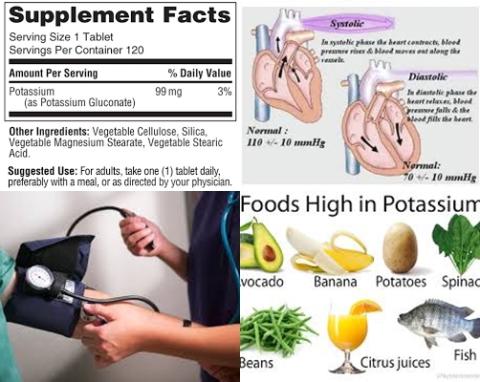
Objectives:
Increased dietary potassium intake is thought to be associated with low blood pressure (BP). Whether potassium supplementation may be used as an antihypertensive agent is a question that should be answered. Therefore, this review article (meta-analysis) has been conducted.
Does potassium supplementation reduce blood pressure among patients with essential hypertension (SBP ≥140 mmHg and DBP ≥90 mmHg)?
Study design:
This review article included 23 trials (9 parallel and 14 crossover randomized placebo-controlled clinical trials with a minimum of 4 weeks of therapy to ensure that the intervention had sufficient time to produce an effect) involving 1,213 patients with essential hypertension (SBP ≥140 mmHg and DBP ≥90 mmHg).
The result of meta-regression revealed that the association between potassium dosage, follow-up period and mean age were not statistically significant; therefore they did not play an important role in the heterogeneity across studies.
There was no publication bias.
Results and conclusions:
The investigators found that potassium supplementation significantly reduced systolic blood pressure (SBP) of patients with essential hypertension with 4.25 mmHg [95% CI = -5.96 to -2.53, I2 = 41%].
The investigators found that potassium supplementation significantly reduced diastolic blood pressure (DBP) of patients with essential hypertension with 2.53 mmHg [95% CI = -4.05 to -1.02, I2 = 65%].
The investigators found in 8 RCTs when compared to baseline, the mean changes in systolic blood of patients with essential hypertension was -8.89 mmHg [95% CI = -13.67 to -4.11] significantly higher in the intervention group (group taking potassium supplements) than the control group.
The investigators found in 8 RCTs when compared to baseline, the mean changes in diastolic blood pressure of patients with essential hypertension was -6.42 mmHg [95% CI = -10.99 to -1.84] significantly higher in the intervention group (group taking potassium supplements) than the control group.
The investigators found in subgroup analysis that the mean difference in systolic blood of patients with essential hypertension was -2.64 mmHg [95% CI = -5.25 to -0.03] in America, -4.56 mmHg [95% CI = -6.51 to -2.62) in Europe and -5.21 mmHg [95% CI = -9.63 to -0.79] in Asia.
The investigators found a dose-response relationship between potassium intake and reduction in systolic and diastolic blood pressure (low-dose (50 mmol/day), moderate-dose (50-99 mmol/day) and high-dose (≥100 mmol/day)).
The investigators concluded that potassium supplementation for at least 4 weeks reduces blood pressure of patients with essential hypertension and therefore, can be recommended as an adjuvant antihypertensive agent for patients with essential hypertension (SBP ≥140 mmHg and DBP ≥90 mmHg).
Original title:
Oral potassium supplementation for management of essential hypertension: A meta-analysis of randomized controlled trials by Poorolajal J, Zeraati F, […], Maleki A.
Link:
http://journals.plos.org/plosone/article?id=10.1371/journal.pone.0174967
Additional information of El Mondo:
Find more information/studies on hypertension and potassium right here.